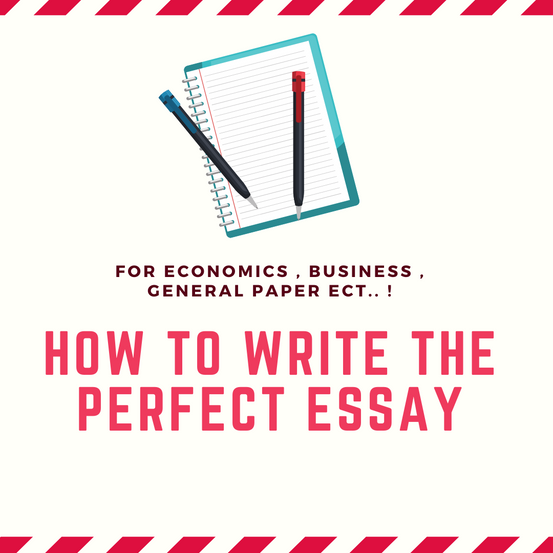Mastering economics essays
- Exam superhero
- Jun 3, 2020
- 4 min read
Updated: Mar 9, 2022
for A levels and GCSEs (O levels)
Mastering the mechanics of an economics essay does not come overnight. It requires a lot of practice and on top of that, you will be subject to a time restriction in your exam. The purpose of economics essays is to offer students the opportunity to make a complex and longer argument on a given topic.
Here is a checklist of what you should do to write a good economics essay

If you are unable to fulfil this checklist, don't worry! Following this step by step guide will help you to drastically improve your essay writing skills for your economics exams. Check out our economics model essays to get an idea!
Step 1: Make sure you understand the question and know precisely what is required
You will be most likely given a number of questions to choose from. Make sure to read ALL of them and highlight the keywords you find in the prompt.
Stick to the question at all times throughout your writing and don't get distracted. After each paragraph, ask yourself whether your answer is still relevant to this particular question.
For complicated questions, break it down into sub-questions.
Here is an example question.
Discuss whether economic efficiency is always achievable in a market economy. [25]
1. Identify the keywords and make sure you understand them
Here, the keywords are economic efficiency and market economy. Economic efficiency is when all goods and factors of production in an economy are distributed or allocated to their most valuable uses and waste is eliminated or minimized. A market economy is an economic system in which economic decisions and the pricing of goods and services are guided by the interactions of a country's individual citizens and businesses.
2. Break the main down into smaller sub-questions
What is economic efficiency?
What is the market economy and what are its characteristics?
In which situation is economic efficiency achievable in a market economy? e.g productive and allocative efficiency
In which situation is economic efficiency not achievable in a market economy? e.g imperfect competition, externalities, public goods, asymmetric information.
3. Stick to the question
Ask yourself whether you are sticking to the keywords after each paragraph
-Have I properly explained how allocative/ productive efficiency is achievable in a market economy? -How do I explain how imperfect information failed to achieve economic efficiency in a market economy?
Step 2: Plan your essay
Making a plan will help you to be on the right track and focus on the main points. Here is an example of how you can plan your essay.
Describe the four components of the current account of the balance of payments. Explain what might cause a deficit in this account. [8] Plan Introduction: definition of current account and current account deficit Body: Part 1 : components of the current account
Trade in goods (visible balance) Trade in services (invisible balance), e.g. insurance and services Investment incomes, e.g. dividends, interest and migrants remittances from abroad Net transfers – e.g. International aid Part 2 : What might cause a deficit
A growing domestic economy
Declining economic activity with trading partners
Structural problems
Conclusion: Summary of main points
More importantly, making a plan will help you to manage your time efficiently during your exam. You will not need to go back and make changes simply because you forgot to include a point.
Step 3: structure your essay correctly
Every good essay must have a proper introduction, body and conclusion. Most importantly, do not forget to include diagrams where possible!
1. The introduction: The introduction section is where you are supposed to provide the main objective of your essay as well as a basic outline. An outline is used to summarize the main argument and needs to be brief.
2. The body: The body section is where you discuss and argue your points.
Start each paragraph with a sentence that clearly addresses the question itself - this will be your thesis for the paragraph and if a reader only read these opening sentences, they should make sense one after the other and provide a summary of your argument
Follow the opening 'topic' sentence with your reasoning and evidence for why this opening statement is valid. Be specific, not general. The more detail you can bring in, the more expert you will sound and the more persuasive your argument will be.
Try to include real-life examples. This may help you to gain some marks
Do not forget to include diagrams where possible.
3. Conclusion: Summarise your argument again or explain which side of the argument you favour. This depends on the question
Step 4: Be as clear and precise as possible
Be explicit – always bear in mind that the essay you are writing is for a reader who has experience and background in the subject area, but they may not necessarily specialize in the specific topic.
Avoid long sentences – always try to avoid suspense; they might seem interesting when analysing but they have been proven hard to read.
Avoid lengthy paragraphs –more than 10 or 15 lines are not okay. Long blocks of written text tend to have a negative mental effect on a reader.
Avoid thinking that the reader knows what you mean –the reader's knowledge may not live up to your expectations.
Check out our economics model essays to see how an A* essay looks like.




















Comments